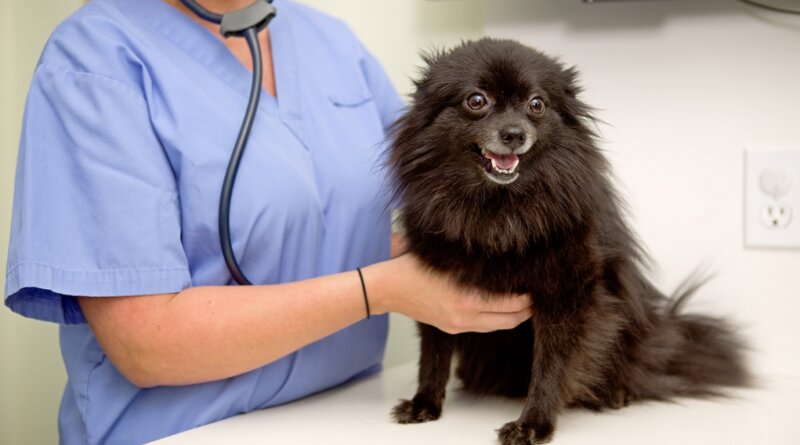10 Things Pet Owners MUST Do
You’re starting to worry that your older dog isn’t able to keep up the way he used to. It’s taken its time to show, but lately, your dog has been getting tired easily and can barely handle a few blocks on his walk without starting to cough and slow down. Could it be congestive heart failure in dogs?

You know your dog is getting up there in age, but you also know that there is something not quite right.
The next day you take Fido in to see the veterinarian for a checkup. After a physical examination, the vet explains that you’re dealing with congestive heart failure in dogs.
What is it? What does that mean? It’s certainly an overwhelming diagnosis, but with a little research you’ll soon figure out exactly what to expect.
CHF stands for congestive heart failure and means that the heart is failing to pump blood through the body effectively.
While it is difficult to take this news about your beloved pet, you are also filled with many questions about CHF and how to take care of your dog from here on out.
Congestive Heart Failure in Dogs
10 Things Pet Owners Must Do
What Causes CHF?
Your dog, like you, can have similar heart problems with aging. Some causes of CHF are preventable through a good diet and exercise throughout life.
There are several causes for congestive heart failure in dogs, while some are preventable others are congenital or inherited.
Dogs that have a congenital heart problem means that they were born with a heart defect. It can sometimes take years or even an injury to exacerbate the problem or even make you aware of it.
Heart disease can take its toll as a dog ages. It can affect one or both sides of the heart and can take years to spot.
Can It Be Inherited?
Your dog can in fact have inherited his congenital heart disease diagnosis, and it can be prevalent in some breeds.
Sometimes dogs can live with these types of heart disease for many years or it may show up late in life.
It can be discovered during a physical if the veterinarian hears a loud heart murmur through a stethoscope. Common congenital defects that your vet may discover are:
- Subaortic stenosis (SAS)
- Tetralogy of Fallot
- Ventricular septal defects (VSD)
- Persistent ductus arteriosis (PDA)
Dogs that have congestive heart failure (CHF) and are diagnosed with one of these congenital heart defects veterinarians will suggest that they be spayed or neutered to prevent spreading the defect within the breed population.
RELATED: Enlarged Heart in Dogs (Dilated Cardiomyopathy)
What are the Symptoms?

This is due to an accumulation of fluid in the lungs and the irritation produced by the enlarged heart pushing against the trachea.
Dogs that have CHF will tire easily and pant excessively while playing and exercising. Taking walks will become more difficult.
They may also show a persistent lack of appetite with a swollen belly. You should check your dog’s gums for signs of paleness or bluishness.
If you see any of these signs consult your veterinarian immediately.
What Are Treatment Options?
If you take your dog in for treatment there are many different options depending on your pet’s particular diagnosis. Your dog will get a treatment plan from a veterinary cardiologist.
The most common treatments for congestive heart failure in dogs available are:
- Oxygen therapy
- Medications
- Heart monitoring
- Blood pressure monitoring
- Symptomatic support and care
- Removal of fluids, from the chest (thoracocentesis) or from the abdomen (abdominocentesis)
With quality care, many dogs do well with medications and treatment. Treatment, however, is about keeping your dog in a good quality of life, not about keeping your emotions intact.
There is no cure for heart disease. As an owner, you have to be aware of your dog’s feelings and abilities and be prepared for when it comes time for humane euthanasia if necessary.
RELATED VIDEO GUIDE: How To Check A Dog’s Heart Rate At Home
10 Things You Should Do to Manage CHF Symptoms
There are many dogs that live long lives with CHF and another congenital heart disease.
Successful living with heart disease is much like it is with humans, it takes care, medications, quality nutrition, and exercise.
Below is a list of 10 things you should do to manage symptoms of congestive heart failure in dogs to ensure your pet lives a quality life.
1. Coughing
If coughing becomes severe, contact your veterinarian. If already diagnosed with CHF and on furosemide, your vet may recommend an additional dose to alleviate any extra accumulation of fluids.
Watch your dog carefully, time coughing, and take notes for the next visit.
2. Difficulty Breathing
With CHF, difficulty breathing indicates fluid build-up in the lungs. Your vet may prescribe additional diuretics like furosemide.
If the difficulty breathing worsens call your veterinarian immediately.
3. Difficulty Sleeping
Dogs may try to sleep on their chest instead of their sides. You may observe your dog trying to sleep quietly sitting up.
This is due to the fluid build-up in the lungs when your dog lies on its side making it uncomfortable. It’s a sign to get a check-up.
4. Exercise
Dogs with CHF should be allowed the amount of exercise they want to enjoy life. If they become tired or weak, it’s best to take a break.
Pushing your dog beyond its limits can cause irregular heartbeats (cardiac arrhythmias).
5. Expensive Medications
When pet medications become expensive, talk to your vet before trying to discontinue usage. Your vet can try a generic or a larger dose than you can split up.
There may also be a less expensive alternative treatment that your vet may be aware of. Call your vet first.
6. Fainting
If your dog faints, also called syncope, you should call your veterinarian immediately to schedule an appointment.
Your vet can order a 24-hour Holter ECG monitor with will record your dog’s rhythms. This will help make for a clearer diagnosis.
7. Loss of Appetite
Certain medications can cause a loss of appetite. A blood test can rule out any additional diagnosis. If it continues, a change in food or adding fish oil can often bring back the appetite.
8. Medication Side Effects
Your veterinarian will always consider that the positive effects of the drug should outweigh the negative effects of its side effects.
This can also mean that a lower dosage should be used in some instances. If you feel like a certain medication is causing your dog issues, have a conversation with your vet and see if the dosage can be adjusted.
9. Urinary Accidents
With any use of diuretics comes the unpleasant after-effect of needing to urinate. Your dog isn’t feeling well, and now has sudden exploding urges to go.
Accidents are going to happen. Try to make sure that you are going to be home while giving these drugs to your dog. This will help eliminate some of the accidents in the house.
10. Vomiting
Many medications that treat CHF may cause vomiting and loss of appetite. If this vomiting is new, due to new meds, or any changes, call your vet to discuss any needed adjustments in treatment.
READ NEXT: Taking A Very Close Look At Causes of Heartworm In Dogs
Related






